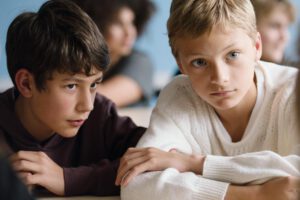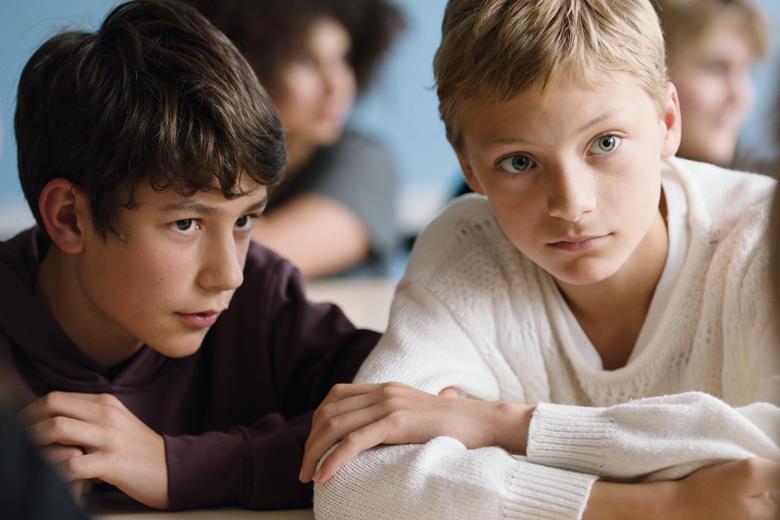Movie Info
Movie Info
- Director
- Lukas Dhont
- Run Time
- 1 hour and 44 minutes
- Rating
- PG-13
VP Content Ratings
- Violence
- 1/10
- Language
- 1/10
- Sex & Nudity
- 2/10
- Star Rating
Relevant Quotes
When David had finished speaking to Saul, the soul of Jonathan was bound to the soul of David, and Jonathan loved him as his own soul.
Do not let the world squeeze you into its own mould.

Close well describes the friendship of two Belgian adolescent boys in Lukas Dhont ‘s heartbreaking film. And like that of David and Jonathan’s it ends in tragedy. One of them will experience the effects of extreme disappointment that leads to despair, and the other will know the sense of betrayal and guilt.
We first see Léo (Eden Dambrine) and Rémi (Gustav De Waele) frolicking together during the last days of their summer vacation. They help on Leo’s family flower farm and race after each other while pretending hostile forces are chasing after them. They spend many a night together, mostly at Remi’s house where the boy’s parents Sophie and Peter regard Leo as a second son. In the same bed at night they snuggle up close to each other, and dawn finds their arms and legs entwined with each other’s. Remi is a talented oboe player, so Leo attends his recital and, from their facial expressions, we can see that Leo is as pleased as the parents with Remi’s excellent performance. The two ride their bikes to school rather than take the bus, so they meet at the same street juncture every school day.
Then comes their entrance into high school where they are able to stay close together because they are in the same class. In the lunch room others notice the boys’ closeness is noticed by another boy who sees Remi resting his head on Leo’s shoulder, something they have done countless times in the past. A girl asks them directly if they are “together.” There is a touch of hostility underlying the question, which Leo senses, although he and Remi are too young to fully comprehend the homophobia that gives rise to such a question.
Unsettled by the question, which he understands is also an accusation, Leo begins to pull back from his friend. During a night over at Remi’s, Leo chooses to sleep in a separate bed. The next morning Lemi finds Remi asleep on his mattress. The two engage in a wrestling match that soon becomes hostile. On the school playground Leo joins some other boys talking about sports. Remi looks on from afar. Leo joins the school hockey team, even though he is an awkward skater. There ensues a number of scenes in which he stumbles, falls, yet perseveres. When Remi comes to watch him practice, Leo barely speaks with him. The last straw is when Leo no longer waits for his friend to bike home together after school. Remi confronts Leo about why he is being rejected, and Leo becomes defensive. The two boys start fighting each other on the playground, with everyone watching them. Remi apparently breaks down, though this is off camera, so we are at first not aware of this.
When Remi does not show up for a school outing, the bus takes off, and the class enjoys their day at the beach. That evening, as the bus approach’s the school, the students are surprised to see all of their parents awaiting them, all in a somber mood. When Leo asks his mother what has happened, she cannot use the word “suicide,” saying onyx that his friend is not with them any more. Realizing that his rejection of his friend contributed to his friend’s death, Leo bottles everything up inside himself. The grief counselors called in by the school meet with small groups of the students, but Leo will not say anything, except one time. And that time reveals the burden of guilt he is carrying. After several classmates say that Remi was a nice guy, Leo interprets one boy’s comment to contain a negative note, and he lashes out at the boy. The remainder of the film deftly deals with the healing process, especially in an explosive scene that turns tender when Leo at last confesses to Remi’s grieving mother Sophie (Emilie Dequenne).
Everything is understated in this film. The camera work underlines the initial closeness of the two friends by almost always shooting the actors in closeups and medium shots. We hardly ever see long shots, even when Leo is on the ice practicing hockey or the two boys are riding their bikes. These medium and closeup shots allow us to see the subtle expressions on the boys’ faces as they navigate the social complexities of their new school. The music by Valentin Hadjadj is as subtle as the dialogue and acting, making this study of adolescent betrayal, guilt and grief a truly moving experience. It could be seen also as a cautionary tale, reminding us that there are deadly prejudices in all the spheres of our society that can be just as harmful to a child as a virulent virus. Although it is adult homophobes who actually murder gay persons, they imbibed their prejudice when they were children and, as we see in the case of Remi and Leo, it can be just as deadly. Some movies inspire or comfort us. Others disturb. This is one of the latter.
This review will be in the April issue of VP along with a set of questions for reflection and/or discussion. If you have found reviews on this site helpful, please consider purchasing a subscription or individual issue in The Store.

